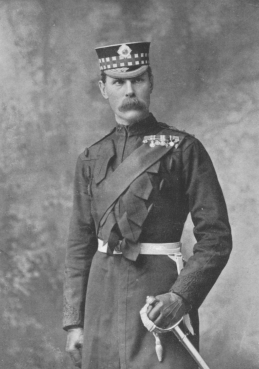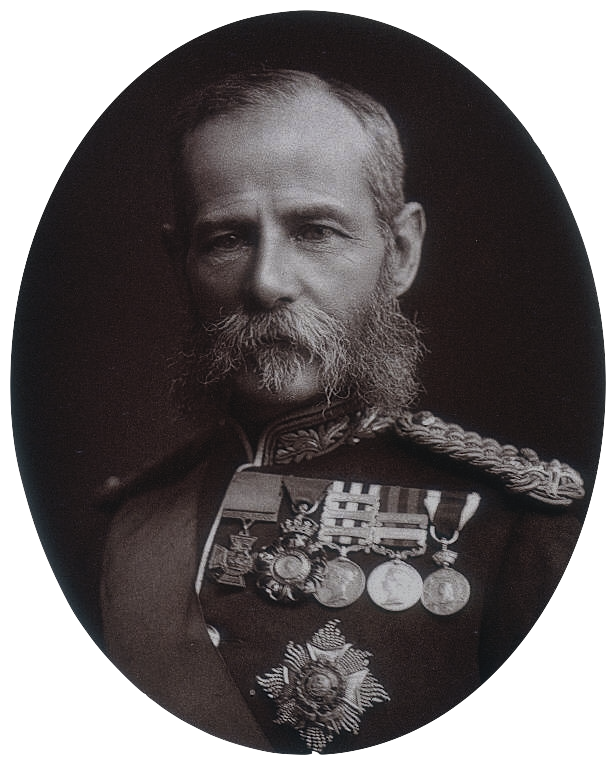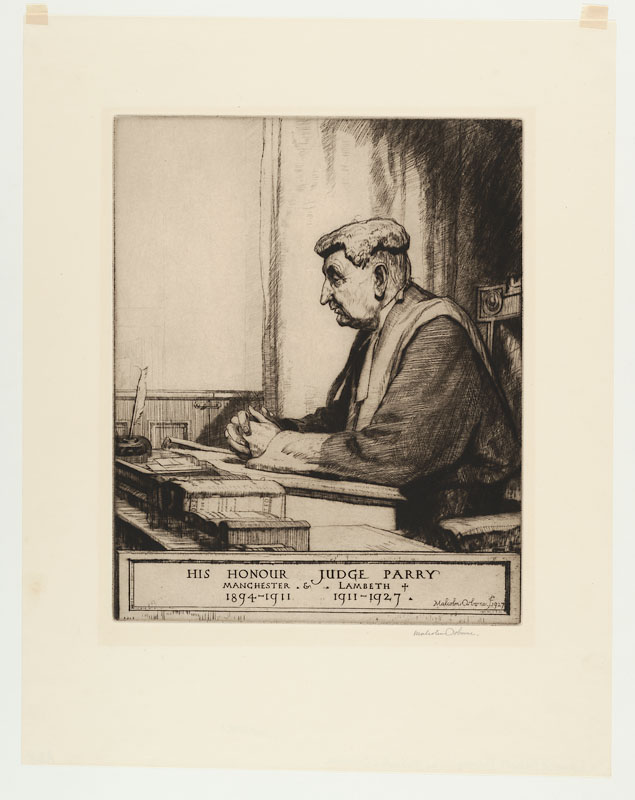|
Alfred Codrington
Lieutenant-General Sir Alfred Edward Codrington, (4 May 1854 – 12 September 1945), was a British Army officer who served in colonial wars in Africa during the late nineteenth century, and later commanded a reserve army during the First World War. Military career Born in 1854, the second son of General Sir William Codrington, he was educated at Harrow and entered the Coldstream Guards in 1873. He first saw active service during the Anglo-Egyptian War of 1882, where he was mentioned in despatches. He later commanded the 1st Battalion Coldstream Guards in the Second Boer War between 1899 and 1902, where he was wounded twice. He took part in the Battle of Magersfontein on 10–11 December 1899, in which the defending Boer force defeated the advancing British forces amongst heavy casualties for the latter. Codrington was mentioned in the despatch from Lord Methuen describing the battle and how he "though wounded, insisted on remaining in command of his battalion till nightfal ... [...More Info...] [...Related Items...] OR: [Wikipedia] [Google] [Baidu] |
British Army
The British Army is the principal land warfare force of the United Kingdom, a part of the British Armed Forces along with the Royal Navy and the Royal Air Force. , the British Army comprises 79,380 regular full-time personnel, 4,090 Gurkhas, and 28,330 volunteer reserve personnel. The modern British Army traces back to 1707, with antecedents in the English Army and Scots Army that were created during the Restoration in 1660. The term ''British Army'' was adopted in 1707 after the Acts of Union between England and Scotland. Members of the British Army swear allegiance to the monarch as their commander-in-chief, but the Bill of Rights of 1689 and Claim of Right Act 1689 require parliamentary consent for the Crown to maintain a peacetime standing army. Therefore, Parliament approves the army by passing an Armed Forces Act at least once every five years. The army is administered by the Ministry of Defence and commanded by the Chief of the General Staff. The British ... [...More Info...] [...Related Items...] OR: [Wikipedia] [Google] [Baidu] |
Paul Methuen, 3rd Baron Methuen
Field Marshal Paul Sanford Methuen, 3rd Baron Methuen, (1 September 1845 – 30 October 1932) was a British Army officer. He served in the Third Anglo-Ashanti War in 1873 and then in the expedition of Sir Charles Warren to Bechuanaland in the mid-1880s. He took a prominent role as General Officer Commanding the 1st Division in the Second Boer War. He suffered a serious defeat at the Battle of Magersfontein, during which he failed to carry out adequate reconnaissance and accordingly his artillery bombarded the wrong place leading to the Highland Brigade taking heavy casualties. He was later captured by the Boers at Tweebosch. After the war, he became General Officer Commanding-in-Chief in South Africa in 1908, Governor and Commander-in-Chief of Natal in 1910 and then Governor and Commander-in-Chief of Malta in 1915. Early life Paul Sanford Methuen was born at Corsham Court, Wiltshire, the eldest of three sons of Frederick Methuen, 2nd Baron Methuen and his wife Anna Ho ... [...More Info...] [...Related Items...] OR: [Wikipedia] [Google] [Baidu] |
National Smallbore Rifle Association
The National Small-bore Rifle Association, the NSRA, is the national governing body for all Small-bore Rifle and Pistol Target Shooting in the United Kingdom, including Airgun and Match Crossbow Shooting. The NSRA is based at The Lord Roberts Centre, within the grounds of the National Shooting Centre in Surrey. National postal competitions are organised all year round, together with a series of meetings, culminating in the Bisley Rifle Meeting, or National Meeting in August, preceded by the Scottish Rifle Meeting in June/July. In 2006, the NSRA founded the National Association of Target Shooting Sports working group in association with the National Rifle Association and Clay Pigeon Shooting Association, to explore the practicalities and benefits of a merger between the bodies. The project was shelved in July 2009 following the withdrawal of the CPSA, followed by the NRA. History Formation The NSRA was originally formed in 1901 as the Society of Working Mens Rifle Clubs. A ser ... [...More Info...] [...Related Items...] OR: [Wikipedia] [Google] [Baidu] |
Edward Abbott Parry
Sir Edward Abbott Parry (2 October 1863 – 1 December 1943) was a British judge and dramatist. Parry was born in London into a prominent Welsh family, the second son of barrister John Humffreys Parry and grandson of antiquary John Humffreys Parry, a leader of the Welsh literature movement in the early 19th century. His great-uncle Thomas Parry was bishop of Barbados and his great-grandfather Edward Parry was Rector of Llanferres, Denbighshire. Parry himself studied at the Middle Temple and was called to the Bar in 1885. He was Judge of Manchester County Court 1894-1911 and became Judge of Lambeth County Court in 1911. He wrote several histories, plays and books for children. He was appointed to sit on a Pensions Appeal Tribunal in the summer of 1917, which dealt with appeals against governmental decisions on military pensions, and later published a book on ''War Pensions: Past and Present'', co-authored with Sir Alfred Codrington, another member of the Tribunal. He died ... [...More Info...] [...Related Items...] OR: [Wikipedia] [Google] [Baidu] |
Herbert Kitchener, 1st Earl Kitchener
Horatio Herbert Kitchener, 1st Earl Kitchener, (; 24 June 1850 – 5 June 1916) was a senior British Army officer and colonial administrator. Kitchener came to prominence for his imperial campaigns, his scorched earth policy against the Boers, his expansion of Lord Roberts' concentration camps during the Second Boer War and his central role in the early part of the First World War. Kitchener was credited in 1898 for having won the Battle of Omdurman and securing control of the Sudan for which he was made Baron Kitchener of Khartoum. As Chief of Staff (1900–1902) in the Second Boer War he played a key role in Roberts' conquest of the Boer Republics, then succeeded Roberts as commander-in-chief – by which time Boer forces had taken to guerrilla fighting and British forces imprisoned Boer civilians in concentration camps. His term as Commander-in-Chief (1902–1909) of the Army in India saw him quarrel with another eminent proconsul, the Viceroy Lord Curzon, who ... [...More Info...] [...Related Items...] OR: [Wikipedia] [Google] [Baidu] |
Military Secretary (United Kingdom)
The Military Secretary is the British Army office with responsibility for appointments, promotion, postings and discipline of high ranking officers of the British Army. It is a senior British Army appointment, held by an officer holding the rank of major-general. The position of Deputy Military Secretary is held by an officer holding the rank of brigadier. The Military Secretary's counterpart in the Royal Navy is the Naval Secretary. The Royal Air Force equivalent is the Air Secretary. The post was initially established as the Public Secretary or Military Secretary to the Commander-in-Chief of the Forces in 1795 (prior to which a civilian had served as Secretary to the Commander-in-Chief). The title was formally changed to Military Secretary to the Secretary of State for War in 1904. It was sometimes referred to in military jargon as Military Secretary at Headquarters. In 1964 it became Military Secretary to the Secretary of State for Defence. In 1995 a new Army Personnel C ... [...More Info...] [...Related Items...] OR: [Wikipedia] [Google] [Baidu] |
Major-General Commanding The Household Division
The Major-General commanding the Household Division commands the Household Division of the British Army and is also the General Officer Commanding London District. In British Army parlance, "The Major-General" always refers to the Major-General commanding the Household Division. The Major-General has sole responsibility for the Service aspect of all State and ceremonial occasions within London District. The office holds executive command of the Household Division and of any other units brought into London for providing military security to the Sovereign, the Royal Palaces as well as for ceremonial purposes and is the main channel of communication between the Household Division and the Monarch. He or she is appointed by The Sovereign, and will previously have commanded a Regiment or Battalion within the Household Division. List of Commanders The holders of this office include: Commanding Home District * General the Duke of Cambridge 1804– Major-General Commanding the Bri ... [...More Info...] [...Related Items...] OR: [Wikipedia] [Google] [Baidu] |
Territorial Force
The Territorial Force was a part-time volunteer component of the British Army, created in 1908 to augment British land forces without resorting to conscription. The new organisation consolidated the 19th-century Volunteer Force and yeomanry into a unified auxiliary, commanded by the War Office and administered by local County Territorial Associations. The Territorial Force was designed to reinforce the regular army in expeditionary operations abroad, but because of political opposition it was assigned to home defence. Members were liable for service anywhere in the UK and could not be compelled to serve overseas. In the first two months of the First World War, territorials volunteered for foreign service in significant numbers, allowing territorial units to be deployed abroad. They saw their first action on the Western Front during the initial German offensive of 1914, and the force filled the gap between the near destruction of the regular army that year and the arrival of ... [...More Info...] [...Related Items...] OR: [Wikipedia] [Google] [Baidu] |
Half-pay
Half-pay (h.p.) was a term used in the British Army and Royal Navy of the 18th, 19th and early 20th centuries to refer to the pay or allowance an officer received when in retirement or not in actual service. Past usage United Kingdom In the English Army the option of half-pay developed during the late 17th and early 18th centuries, at the same time as the system of purchasing commissions and promotions by officers took hold. Serving officers could go on half-pay voluntarily, or be obliged to do so if their services were not required. In both cases, they could be summoned back to their regiments if there was a sudden need for their services. As an example, during the Jacobite rising of 1715, all listed half-pay officers were recalled to the army. In the long period of peace that the reduced British Army experienced after the Napoleonic Wars, the half-pay system became a means by which arduous overseas service could be avoided. Well-to-do officers who were promoted through the p ... [...More Info...] [...Related Items...] OR: [Wikipedia] [Google] [Baidu] |
King's South Africa Medal
The King's South Africa Medal is a British campaign medal awarded to all British and Colonial military personnel who served in the Second Boer War in South Africa, and who were in the theatre on or after 1 January 1902 and who had completed 18 months service in the conflict prior to 1 June 1902.North East Medals Medal Guide: King's South Africa Medal 1901–02 (Retrieved 2015-03-14) Institution The fourth campaign medal relating to the Second Boer War, and the second which could be awarded for service in South Africa, the King's South Africa Medal was instituted in 1902 and was the first British campaign medal to be instituted by King |
Queen's South Africa Medal
The Queen's South Africa Medal is a British campaign medal awarded to British and Colonial military personnel, and to civilians employed in an official capacity, who served in the Second Boer War in South Africa. Altogether twenty-six clasps were awarded, to indicate participation in particular actions and campaigns. Institution The Queen's South Africa Medal was instituted by Queen Victoria in 1900, for award to military personnel and civilian officials who served in South Africa during the Second Boer War from 11 October 1899 to 31 May 1902.The Queen's South Africa Medal 1899 - 1902 Retrieved March 13, 2015. Three versions of the medal are known. Since the war was initially expected to be of short duration and to reach its conclusion in 1900, the first medals were struck w ... [...More Info...] [...Related Items...] OR: [Wikipedia] [Google] [Baidu] |






